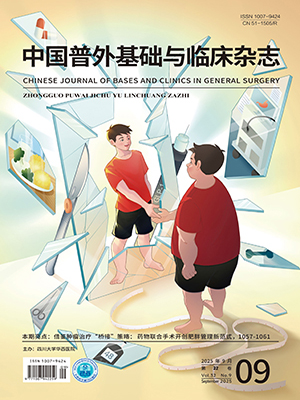【 Abstract 】 Objective To discuss incidence of the complications in the rectal cancer patients ’ early postoperative being treated with neoadjuvant chemotherapy combined with surgical intervention. Methods The rectal cancer patients under surgical therapy being diagnosed definitely, with neoadjuvant chemotherapy under multi-disciplinary team (MDT) or without and firstly being discovered from April to October of 2007 were studied. The complication conditions of these patients 1 month after operation were studied and observed, and the differences between MDT group and non-MDT group were compared. Results According to the condition, 189 rectal cancer patients were internalized. Among all the patients, the distance of tumor to the dentate line were lt;3 cm 38 cases, 3 ~ 7 cm 86 cases, ≥ 7 cm 65 cases; pathological stage were Ⅰ stage 5 cases , Ⅱstage 122 cases, Ⅲstage 50 cases, Ⅳstage 12 cases. There were 181 cases laparotomy, 8 cases laparoscopic operation; 33 cases stoma operation, 156 cases non-stoma operation. The total incidence of postoperative complication was 27.0% (51/189). Of all, incision bleeding was 1 case, abdominal (deep) bleeding were 4 cases, anastomosis bleeding were 5 cases, pulmonary infection was 1 case, wound infection were 7 cases, urinary tract infection were 3 cases, abdominal (deep) infection was 1 case, unknown fever were 19 cases, superficial layer wound dehiscence was 1 case, wound co-liquation were 15 cases, anastomosis leakage were 3 cases, rectovaginal fistula were 2 cases; intestinal obstruction were 7 cases, urinary retention were 7 cases, stress ulcer were 2 cases. Follow-up in 2-10 months after operation, there was no death case. The baseline between MDT group and non-MDT group was equal. The ratio of postoperative blood transfusion of MDT group was obviously less than that of non-MDT group (P<0.05). Moreover, the operation time of MDT group was obviously shorter than that of non-MDT group, and the difference was statistically significant (P<0.05). But the ratio of laparotomy and laparoscopic operation, of stoma operation and non-stoma operation, as well as the types of radical excision operation of rectal cancer didn’t show any statistical difference between two groups (P gt;0.05). The postoperative venting time, defecation time, intake time didn’t show any statistical difference between two groups too. But the postoperative out-of-bed activity time and the postoperative in-hospital days of MDT group was obviously shorter than that of non-MDT group, and the difference was statistically significant (P<0.05). In MDT group the postoperative total complication rate was less than non-MDT group, and the difference was statistically significant (P<0.05). Among all the complications, the MDT group had a lower rate of wound infection, wound co-liquation and urinary retention (P<0.05). Using multifactorial logistic regression analysis, the risk factor which influenced the postoperative complication rate in MDT group were: postoperative intake time and postoperative hospitalization time. But the risk factor in non-MDT group was only according to postoperative hospitalization time. Conclusion The patients who were treated by MDT, definite operative method combining neoadjuvant chemotherapy or not didn’t increase the postoperative complication rate and risk. So it could be believed that such a composite treatment was feasible and safe in early postoperative stage. But it needs further studies to evaluate the medium- and long-term clinical effect.
Citation: WA N G X iaodong,CAO L in,Z EN G Tianf ang,YA N G Chuanhua,QIU Meng,L I L i. Influence of Neoadjuvant Chemotherapy to Rectal Cancer Early Postoperative Complications in Multi-DisciplinaryTeam: A Case2 Control Study. CHINESE JOURNAL OF BASES AND CLINICS IN GENERAL SURGERY, 2008, 15(4): 289-294. doi: Copy
Copyright © the editorial department of CHINESE JOURNAL OF BASES AND CLINICS IN GENERAL SURGERY of West China Medical Publisher. All rights reserved




